Northwestern’s Class of 2024: Grads to Watch in Energy and Sustainability
Every year, more and more Northwestern students seek out a future in sustainability and energy—meet some of the Class of 2024 working towards a more sustainable future
Each year, a growing number of Northwestern students are setting their sights on careers and advanced education that tackle today’s most pressing environmental challenges. From safeguarding natural resources to pioneering solutions in the energy transition, the Class of 2025 is prepared to make a difference. Read about students from this year’s graduating class, some of whom are alumni of programs at the Paula M. Trienens Institute for Sustainability and Energy.
Congratulations graduates – We look forward to seeing what part you play in building a more sustainable future!
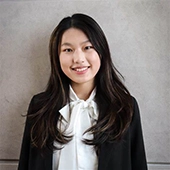
Seora Kim graduates in June 2025 earning a BA (Bachelor of Arts) in Economics with minors in Global Health and Data Science from Judd A. and Marjorie Weinberg College of Arts and Sciences, along with a Curious Life certificate from the Robert R. McCormick School of Engineering and Applied Science.
What are your plans after graduation? After graduation, I plan to pursue a master’s in law with the intention of working in the sustainable healthcare sector, where I can bridge legal frameworks with environmental health initiatives.
How will you pursue energy and/or sustainability in your work and why is this work meaningful for you? I will focus on developing sustainability laws in healthcare through both academic research and professional practice. Specifically, I aim to lead projects that optimize renewable energy integration in healthcare services and medical device manufacturing. This work is profoundly meaningful to me because it directly addresses climate change while advancing global health outcomes and environmental stewardship—passions that were first cultivated during my transformative experience at United World College and have continued to drive my academic and career pursuits.
What did you learn at Northwestern that you expect to carry with you into the future? Through my diverse experiences in classes, research, internships, study abroad in Oxford, and extracurricular activities at Northwestern, I discovered that failure is an essential pathway to success and that overcoming the fear of failure is crucial for growth. This revelation has instilled in me a deep commitment to maintaining curiosity throughout my life and continuously exploring unlimited possibilities. Northwestern taught me that the greatest discoveries and innovations come from those willing to ask difficult questions, take calculated risks, and persist through challenges—lessons that will guide my approach to tackling complex issues in sustainable healthcare law.
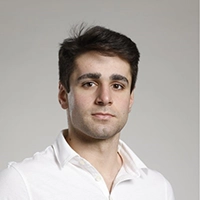 Alex Roessner graduates in June 2025 earning a BA (Bachelor of Arts) in Economics and Environmental Policy and Culture from Weinberg College with a minor in Asian Languages and Cultures (Chinese), as well as the Sustainability and Energy Certificate from the Trienens Institute.
Alex Roessner graduates in June 2025 earning a BA (Bachelor of Arts) in Economics and Environmental Policy and Culture from Weinberg College with a minor in Asian Languages and Cultures (Chinese), as well as the Sustainability and Energy Certificate from the Trienens Institute.
What are your plans after graduation? After graduation, I will focus on scaling my company’s work with smallholder farmers and specialty commodities in Sumatra, Rwanda, and Ecuador—where we’re building transparent, regenerative trade models that connect local producers to premium global markets. In parallel, I will expand the Roessner Restoration Initiative (RRI), a nonprofit foundation I founded during my time at Northwestern to align biodiversity conservation with sustainable economic development. For me, regenerative trade and conservation finance are inseparable: economic value must actively support environmental resilience. My immediate next steps include deepening partnerships with local communities, refining pricing structures for greater transparency, and piloting new projects that bridge international trade and conservation impact.
How will you pursue energy and/or sustainability in your work and why is this work meaningful for you? Sustainability is at the core of my professional mission: transforming extractive trade models into regenerative, community-driven systems. I plan to expand the integration of green finance tools—including debt-for-nature swaps and exotic derivatives—to unlock capital for renewable energy, reforestation, and biodiversity conservation. This work is deeply personal to me because it allows me to combine my passion for finance and entrepreneurship with my commitment to protecting ecosystems and supporting local communities. I see each transaction as an opportunity to rebalance economic and environmental value chains, ensuring that growth also delivers on climate and biodiversity goals.
What did you learn at Northwestern that you expect to carry with you into the future? Northwestern taught me to see challenges as opportunities to build bridges—between markets and ecosystems, between finance and local communities, and between my own goals and the broader mission of sustainable development. My economics and environmental policy courses gave me the tools to analyze trade and finance not as abstract systems but as levers for real-world impact. My experience as a student-athlete taught me resilience and the value of collaboration—skills that have become essential in my work with farmers and conservation partners. Above all, I carry forward the conviction that the most meaningful solutions are interdisciplinary and rooted in community.
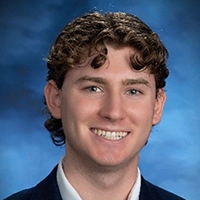 Sam Rappin graduates in June 2025 earning a BA (Bachelor of Arts) in Environmental Studies from Weinberg College and a minor in Entrepreneurship from McCormick.
Sam Rappin graduates in June 2025 earning a BA (Bachelor of Arts) in Environmental Studies from Weinberg College and a minor in Entrepreneurship from McCormick.
What are your plans after graduation? After graduation, I'll be joining Schneider Electric in Boulder, Colorado, as a Sustainability Analyst within their Sustainability Leadership Program (SLP), a two-year rotational program.
How will you pursue energy and/or sustainability in your work and why is this work meaningful for you? The SLP involves three distinct eight-month rotations. My first rotation will be with Schneider’s Global Sustainability Practice, where I’ll assist companies in reaching their sustainability targets through projects such as ESG strategies, Scope 3 emissions analysis, and other decarbonization goals. This work resonates with me because it directly contributes to combating climate change and equips me with critical skills and knowledge for my long-term career goals. Ultimately, I aim to become a Chief Sustainability Officer at a Fortune 500 company or to launch my own sustainability-focused venture, particularly in areas related to food systems and biodiversity.
What did you learn at Northwestern that you expect to carry with you into the future? At Northwestern, my major in Environmental Studies and minor in Entrepreneurship provided me with an understanding of the scientific, historical, economic, and political dimensions of sustainability. Beyond academics, I gained valuable leadership and hands-on experience: I founded Plant Futures, a club dedicated to career advancement and education in sustainable and plant-based food systems; led the Northwestern Energy and Sustainability Club (NESC); co-founded ScaleUp, a startup aimed at innovatively utilizing fish byproducts; and helped establish and lead the inaugural Chicago Energy Conference. These experiences have equipped me with the skills, perspective, and passion necessary to pursue sustainability both professionally and personally.
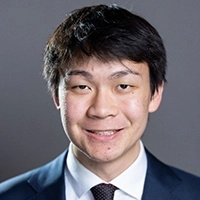 Derrik Chen graduates in June 2025 with a BA (Bachelor of Arts) in Economics from Weinberg College, a BS (Bachelor of Science) in Data Science from Weinberg College, and the Sustainability and Energy Certificate from the Trienens Institute.
Derrik Chen graduates in June 2025 with a BA (Bachelor of Arts) in Economics from Weinberg College, a BS (Bachelor of Science) in Data Science from Weinberg College, and the Sustainability and Energy Certificate from the Trienens Institute.
What are your plans after graduation? After graduation, I'll be joining Marathon Capital as an investment banking analyst.
How will you pursue energy and/or sustainability in your work and why is this work meaningful for you? Marathon Capital is the largest independent investment bank dedicated to servicing the clean economy. My work at the firm will be centered around the clean energy transition, particularly assisting with the sale of renewable energy assets, such as solar and wind farms. I will be focused on moving capital towards the clean energy transition, which is meaningful to me as I believe climate change represents an enormous threat to societies and economies.
What did you learn at Northwestern that you expect to carry with you into the future? In the many Trienens Institute and economics courses that I took, I learned a lot about the clean energy transition, including the basics of energy production, the different types of renewable energy production, the policy and law behind the clean energy transition, and the broader economics that factor into the transition. I'm happy to say that Northwestern has equipped me with a strong skillset to attack the climate change issue head-on.
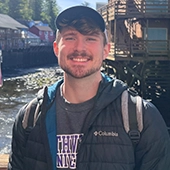 Logan Fenimore graduates in June 2025 earning a Ph.D. in Chemical & Biological Engineering from McCormick as well as the Media and Science Communication certificate from the Medill School of Journalism, Media, Integrated Marketing Communications.
Logan Fenimore graduates in June 2025 earning a Ph.D. in Chemical & Biological Engineering from McCormick as well as the Media and Science Communication certificate from the Medill School of Journalism, Media, Integrated Marketing Communications.
What are your plans after graduation? Last October, I was awarded a NRC (National Research Council) Postdoctoral Research Fellowship to work at the National Institute of Standards and Technology (NIST) in Gaithersburg, Maryland after graduation. I plan to conduct research to understand how we can harness dynamic chemical reactions to make new, recyclable, and industrially relevant polymer networks. Ultimately, I'd enjoy being a faculty member somewhere that I can lead a happy life.
How will you pursue energy and/or sustainability in your work and why is this work meaningful for you? Sustainability was the throughline of my Ph.D. research at Northwestern. The goals of sustainability research at NU were the most tangible and accessible to me as an incoming graduate student back in 2020, and, once I got my footing around here, I really came to resonate strongly with efforts to curb plastic pollution. My research at NU was on the cutting edge of the science behind recyclable polyethylene-based networks, which have potential as alternatives for unrecyclable networks currently used in industry. Further, I witnessed the devastating effects of polluted plastics on island coastlines of Alaska last year thanks to the Trienens Institute, who sponsored my travel for a marine debris recovery expedition. That trip was influential, formative, and very timely, as my desire to stay in academia crystallized not long before that trip; it's pretty motivating to see seemingly millions of plastic pieces of all sizes littered across remote Alaskan beaches, no human civilizations in sight. If you extrapolate the damage done on the ecosystems I saw to all the beaches in the rest of the world, then you realize the magnitude of the issue we have on our hands with plastics. I am enthusiastic to advance my research career in elucidating the interesting physics behind such materials so we may improve their design and hopeful widespread implementation.
What did you learn at Northwestern that you expect to carry with you into the future? I really came away understanding and feeling the importance of community, value alignment, and genuine human connection at this school. My experiences and relationships helped ground me through the breadth of experiences I had here and gave me the clearest sense of not only my short- and long-term career goals but also who I am and what I value. I've always been a 'try everything at the buffet' kind of person, and being a graduate student at Northwestern and engaging broadly with this campus and its people felt like the closest thing to a 'life buffet.' I feel that I have a stronger sense of who I am than I ever have in my whole life, and I know Northwestern helped me harness my strengths and facilitated much of my growth as a human being.
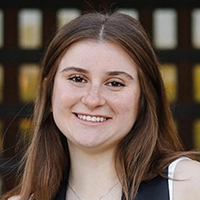 Talia Ginsberg graduates in June 2025 from Weinberg with a BA (Bachelor of Arts) in Global Health Studies and Political Science with a minor in Data Science.
Talia Ginsberg graduates in June 2025 from Weinberg with a BA (Bachelor of Arts) in Global Health Studies and Political Science with a minor in Data Science.
What are your plans after graduation? I will pursue a master’s in public health from Northwestern University Feinberg School of Medicine while interning at a Chicago-based health organization.
How will you pursue energy and/or sustainability in your work and why is this work meaningful for you? Sustainability across all sectors — health care, energy, urban development, food, water — is crucial to improving often socially determined health outcomes and mitigating the worst impacts of climate change. Receiving my master’s in public health from Northwestern will prepare me to evaluate sustainability and climate resilience in public health programming and infrastructure. In my career, I plan to use these skills to evaluate current health practices and advocate for policy change centered around the long-term sustainability and resilience of health care.
What did you learn at Northwestern that you expect to carry with you into the future? Northwestern has taught me to be attentive to where issues, sectors, and domains intersect. My experience researching water insecurity through various lenses — including its impact on mental health and the global governance of water at COP29 — taught me that understanding the intersections between the key issues we face reveals a far more accurate picture of the challenges at hand. This perspective is essential for addressing sustainability and equitable adaptation to climate change within health systems, where long-term solutions require structural thinking (and re-thinking), not just surface-level fixes. I know that in the future I will continue to look beyond what is right in front of me to understand the relationships between sustainability-related (or seemingly unrelated) domains to best develop just, effective health and life solutions.
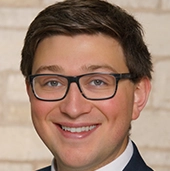 Ryan Whittemore graduates in June 2025 with a MS (Master of Science) in Energy and Sustainability (MSES) administered by the Trienens Institute and conferred by McCormick.
Ryan Whittemore graduates in June 2025 with a MS (Master of Science) in Energy and Sustainability (MSES) administered by the Trienens Institute and conferred by McCormick.
What are your plans after graduation? After graduation, I will be joining Schneider Electric as a Project Sourcing Associate for Clean Energy Investments in their Energy and Sustainability Services team. In this role, I’ll help connect energy developers, financial institutions, and corporate buyers with financing for energy infrastructure projects that create jobs, support decarbonization, and enable the energy transition.
How will you pursue energy and/or sustainability in your work, and why is this work meaningful for you? My work will focus on enabling the development and financing of clean energy projects through mechanisms such as tax credit transfers, power purchase agreements (PPAs), and renewable energy certificates (RECs). These tools are critical to scaling carbon-free technologies by reducing financial barriers and attracting private investment to large infrastructure projects. Just as importantly, they help drive job creation and manufacturing growth across the country.
To me, sustainability is about more than just reducing emissions, it’s about building systems that are resilient, inclusive, and economically empowering. To that end I am excited to play a role in bringing clean energy projects from concept to reality, supporting a wide range of technologies including battery storage, hydrogen, solar, wind, and geothermal.
Proving that clean energy projects are viable is especially meaningful to me because growing up in West Virginia I witnessed firsthand how energy systems can both fuel local economies and leave lasting environmental harm. Too often these goals of economic development and environmental protection are pitted against each other, but a future that is good for both people and the planet is possible. In this role I will be helping to create that better future through turning ideas into on-the-ground infrastructure projects
What did you learn at Northwestern that you expect to carry with you into the future? When I began the MSES program, I knew I wanted to contribute to the energy transition but wasn’t sure how to apply my background in policy to a space that often feels dominated by engineering and finance. Northwestern gave me the tools, and the confidence, to bridge those gaps. The program emphasized how sustainability challenges require a systems-level approach that brings together technology, economics, and public policy.
More than anything, I learned from my peers. Their diverse experiences and perspectives reinforced that solving climate and energy challenges isn’t just a technical or economic issue—it requires collaboration across disciplines and sectors. As I move forward in my career, I carry with me that integrated approach and a deep sense of possibility for what can be accomplished when different ways of thinking are aligned behind one goal.
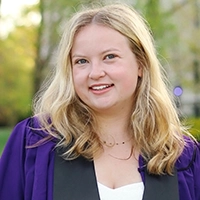 Katie Cummins graduates in June 2025 with a BA (Bachelor of Arts) from the Northwestern School of Communication with a Communication major and Business Institutions minor, as well as the Sustainability and Energy Certificate from the Trienens Institute.
Katie Cummins graduates in June 2025 with a BA (Bachelor of Arts) from the Northwestern School of Communication with a Communication major and Business Institutions minor, as well as the Sustainability and Energy Certificate from the Trienens Institute.
What are your plans after graduation? After graduation, I plan to continue working with Blue Strike Environmental in their Climate & Energy division.
How will you pursue energy and/or sustainability in your work and why is this work meaningful for you? In the future, I hope to work on transitioning people into a more sustainable and just society. Specifically, I want to bridge gaps between workers, researchers, policymakers, businesses, and communities to ensure everyone reaps the benefits of a green revolution and no one is left behind.
What did you learn at Northwestern that you expect to carry with you into the future? I'll forever be grateful for the opportunities I've been able to access at Northwestern and I know what I've learned from these experiences will stick with me for years to come. As a sophomore, I started to attend Trienens Institute, The Roberta Buffett Institute for Global Affairs, and Harvey Kapnick Center for Business Institutions faculty lectures. By my junior year, I was a part of the advocacy effort for the inclusion of sustainability in the Wildcat Welcome curriculum. I’ve since traveled to Chile to study critical mineral extraction and to Azerbaijan as part of Northwestern’s delegation to COP29. Each experience deepened my understanding that preparing society for the future is going to be a big, interdisciplinary team effort, requiring an infinite amount of approaches. The challenges are big — but so is the talent, creativity, and determination of the people working on them. Meeting and working with kind and intelligent people at Northwestern has made me optimistic about our capacity to build and implement lasting solutions, and I hope to carry this optimism with me well into the future.
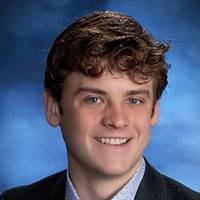
Foster Lehman graduates in June 2025 with a BA (Bachelor of Arts) in Theatre and Economics from the Northwestern School of Communication and a minor in Chemistry from Weinberg.
What are your plans after graduation? After graduation, I’ll be formally joining the private equity industry as a business analyst, while simultaneously pursuing an independent startup I founded during my time at Northwestern. Leveraging my background in both finance and chemistry, I aim to bridge the gap between sustainability and profitability. Specifically, I’ve developed a novel, solar-catalyzed process that converts unused (and often landfilled) agricultural waste into high-value, in-demand products. By transforming inedible corn stover, wood waste, and other plant materials into sugars, my process enables the production of bioplastics, sustainable aviation fuel, and green pharmaceutical precursors. I’ll be presenting on this topic at a California YPO Chapter Day on November 12.
How will you pursue energy and/or sustainability in your work and why is this work meaningful for you? Despite the very real and existential challenges posed by climate change, I remain deeply optimistic about our ability to build a sustainable, circular economy. I believe the key to this future lies in curiosity and interdisciplinary thinking. It is often at the intersection of disciplines that the most creative and transformative ideas emerge - something I’ve experienced firsthand throughout my academic journey.
Interdisciplinary study has been a central theme in my education. In courses on green chemistry, environmental chemistry, organic chemistry, and a range of economics classes, I repeatedly noticed critical gaps and problems that seemed unsolvable within the confines of a single discipline, yet ripe for innovation when approached from multiple perspectives.
One moment that particularly inspired me came during a green chemistry discussion on waste recycling.
What I discovered was that technical feasibility is only one side of the equation - economic viability is just as essential. Yet few students had the cross-disciplinary background to fully grapple with both sides. Recognizing this disconnect, I realized how my combined background in chemistry and economics positioned me uniquely to help bridge that gap and I’ve been motivated ever since to do just that.
What did you learn at Northwestern that you expect to carry with you into the future? Northwestern has provided me with a rigorous interdisciplinary education, but just as importantly, it has fostered a culture that encourages students to challenge what they’re taught. While I expect to be a lifelong learner, one of the most enduring lessons I’ll carry with me is this: question the status quo. Reexamine assumptions. Don’t fear failure - because each misstep brings you closer to a solution, a breakthrough, or a design that actually works. These guiding principles are ones that Northwestern has instilled in me, and I intend to apply them wherever my path leads.
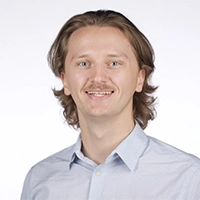 Simon Hedin graduates in June 2025 with a BA (Bachelor of Arts) in Chemical and Biological Engineering from McCormick as well as a minor in Material Science from Weinberg.
Simon Hedin graduates in June 2025 with a BA (Bachelor of Arts) in Chemical and Biological Engineering from McCormick as well as a minor in Material Science from Weinberg.
What are your plans after graduation? Starting a PhD at the University of California – Berkeley in Chemical and Biomolecular Engineering.
How will you pursue energy and/or sustainability in your work and why is this work meaningful for you? Growing up on a farm in MN, I noticed firsthand as winters grew shorter, heat waves grew more intense, and droughts stifled crops. These warning signs of a shifting climate motivated my interest in energy and sustainability. I plan to pursue a more sustainable future through my work as a researcher, by studying the production of alternative fuels and sustainable chemicals. My undergraduate research at Northwestern focused on using light to create hydrogen fuel, a fossil fuel alternative, in a process called photocatalysis. I will continue prioritizing sustainability during my PhD and beyond, studying how green electricity from solar and wind can be directly used to directly produce sustainable hydrogen fuel.
What did you learn at Northwestern that you expect to carry with you into the future? At Northwestern, conducting undergraduate research in the Notestein Group showed me that persistent and curiosity-driven research is critical to making meaningful breakthroughs. Through advanced coursework in energy storage and sustainable materials, I built a strong technical foundation that has prepared me for a long and impactful career in sustainability science. Just as importantly, Northwestern taught me that true innovation occurs when driven people from diverse disciplines and backgrounds come together to solve a problem. I also learned that effective communication and collaboration is the key to translating lab-scale scientific progress to grid-scale sustainability solutions. I am excited to use all I have learned at NU to build a more sustainable future through research.